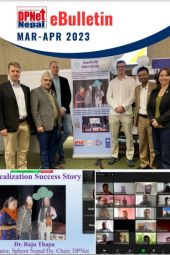March-April 2023 eBulletin
Summary
This DPNet's ebulletin highlights a series of significant events and discussions from March to April 2023, showcasing efforts towards disaster preparedness, climate resilience, and the effective localization of humanitarian standards in Nepal. A notable event was the Province Level Discussion on Climate and Disaster Vulnerability in the Doda Watershed, organized in Dhangadhi in collaboration with NEEDS Nepal and the Mercy Corps' Zurich Flood Resilience Alliance Program. This gathering brought together local and provincial government stakeholders to address the vulnerabilities and promote sustainable development within the Doda Watershed, emphasizing collaborative mechanisms for disaster management and environmental conservation.
The discussions highlighted the importance of a Landscape Approach to address climate and disaster vulnerabilities, underscoring the need for integrated watershed management, sustainable agricultural practices, and community-based disaster risk reduction strategies. A draft Memorandum of Understanding was prepared to outline the responsibilities of municipalities towards implementing initiatives to mitigate challenges in the Doda Watershed, emphasizing afforestation, disaster management improvement, and local community involvement in decision-making processes.
Further, the bulletin covers Nepal's commendable efforts in localizing Sphere Standards, showcased during the online Humanitarian Networks and Partnerships Week (HNPW). Dr. Raju Thapa, Vice Chair and Coordinator of Sphere Nepal, shared Nepal's success story, highlighting the critical role of Sphere Standards in disaster response and resource management. The country's approach involved engaging diverse stakeholders through a Basket Fund, distributing Sphere Handbooks across local governments, and utilizing indigenous methods to raise community awareness. The session highlighted Nepal's innovative strategies in implementing Sphere Standards, including simulation exercises to clarify specific indicators and the practical application of training at the community level.
Moreover, an information session on the International Training Programme - Disaster Risk Management was organized to disseminate details about the training offered by The Swedish International Development Cooperation Agency (Sida). The session aimed at enhancing the involvement of DRRM stakeholders and featured insights from alumni and current participants, emphasizing the importance of understanding disaster risk reduction's root causes and planning impactful initiatives post-training.
Lastly, the participation of the DPNet and DiMaNN Team in the HNPW in Geneva highlighted Nepal's achievements in localizing humanitarian standards and fostering international collaboration. Meetings with key figures from organizations such as OCHA and INSARAG discussed potential support for Nepal, while interactions with Peaceland Foundation and CHS Alliance emphasized the global recognition of Nepal's efforts in humanitarian standard localization and disaster preparedness. This series of events and discussions underscore DPNet's commitment to strengthening disaster preparedness and climate resilience in Nepal, fostering local and international collaboration, and enhancing the capacity of various stakeholders to address the challenges and impacts of disasters and crises more effectively.
Categories:
DPNet Publication
Sub-Categories:
Ebulletin
Published Year:
2024
